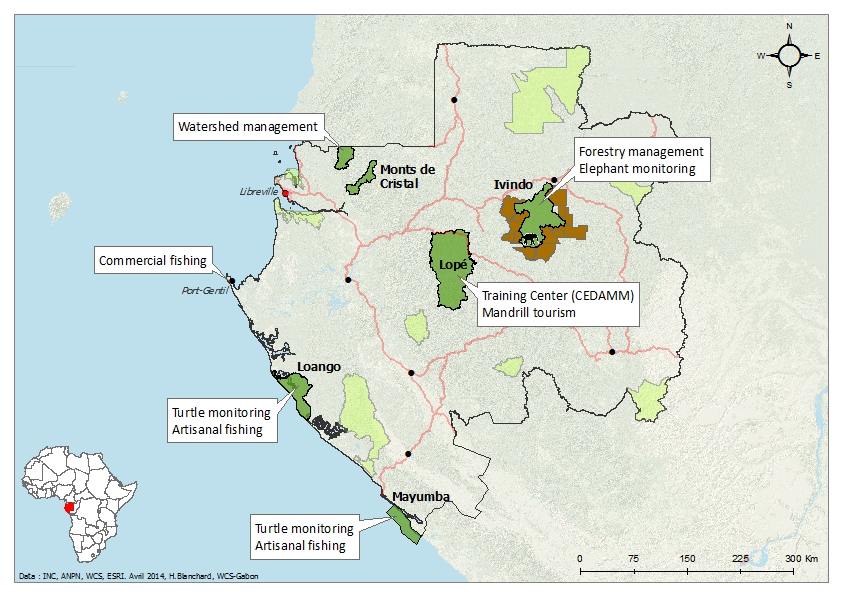Bienvenue à WCS Gabon
Le Gabon est un véritable Jardin d’Eden Africain, abritant quelques
uns des plus anciens vestiges de civilisations humaines sur Terre et un
éventail varié d’espèces animales emblématiques d’Afrique Centrale. Des
espèces telles que les gorilles, les chimpanzés, des éléphants et des
mandrills vivent dans ses vastes forêts luxuriantes, tandis que ses
côtes abritent des baleines à bosse, des tortues luths et plus de 60
espèces de requins et de raies. Comme un pont entre l’océan et les
forêts vierges, ses côtes sont parmi les plus spectaculaires et les plus
sauvages du Monde.
Le pays demeure un refuge pour la faune en raison de son isolement
relatif et de sa faible démographie, en particulier sur la côte.
Toutefois, des menaces émergeant du développement industriel et de la
globalisation obligent le pays à trouver des stratégies de conservation
innovantes afin qu’il demeure un refuge pour son incroyable
biodiversité. Les parcs nationaux du Gabon, créés en 2002, sont les
pierres angulaires de ces efforts de conservation, Bien qu’il reste
encore beaucoup de travail à fournir afin de préserver cette nature
unique en son genre.
Quelques faits saillants
· Le Gabon
est aujourd'hui le dernier bastion des éléphants de forêts en Afrique
Centrale. Près de 50.000 éléphants vivent dans les vastes forêts
gabonaises. Les derniers éléphants « gros-porteurs » de grandes défenses
du Bassin du Congo, peuvent encore être vus au Bai de Langoué dans le
Parc National d’Ivindo.
· Une troupe
d’environ 800 mandrills peut être observée dans le Parc National de la
Lopé. Il s'agit du plus grand rassemblement de primates connu au Monde, à
l’exception de l’Etre Humain.
· Le Gabon
est le premier site de nidification des tortues luth au Monde. On estime
à 41.000, le nombre de tortues femelles venant pondre sur les plages
gabonaises.
· Un des plus
grands rassemblements de baleines à bosse a lieu le long des côtes
Gabonaise au moment de la saison de reproduction après leur grande
migration depuis l’Océan Australe. Une estimation récente indique que
cette population comprendrait jusqu’à 10.000 baleines.
Défis
Alors que le Gabon s'ouvre vers le monde extérieur et diversifie son
économie, de nouvelles routes et le réseau ferroviaire apportent un
afflux de travailleurs dans des régions précédemment isolées ou
difficilement accessible, provoquant une hausse alarmante du braconnage
et du trafic d’animaux sauvages, de déforestation, etc. De plus, à
mesure que de nouvelles sources de minerais, de pétrole et de gaz sont
découvertes, des conflits d’intérêts surgissent entre l'exploitation des
ressources naturelles pour booster une économie en plein développement
et la nécessité de préserver un patrimoine naturelle de grande valeur.
WCS répond
L’histoire de WCS au Gabon a commencé en 1985, avec les premiers
recensements des éléphants de forêt et du suivi d’un plan national
d’évaluation des priorités de conservation. Ces travaux de recherche
pionniers ont donné lieu à de remarquables résultats quand WCS a assisté
le gouvernement dans la mise en place de son réseau de parcs nationaux
en 2002, lequel comprend aujourd’hui 13 parcs couvrant plus de 10% du
territoire national.
Ce nouveau réseau de parcs nationaux a été en grande partie le
corollaire du « Megatransect » réalisé par l’explorateur en titre du
WCS, le Dr. Mike Fay qui a exploré les forêts les plus inaccessibles du
Gabon et de la République du Congo. Dr. Fay et ses assistants locaux
ont parcouru plus de 3220km en 456 jours au cœur de la forêt du Bassin
du Congo, préoccupés par la crainte que l’expansion de l’exploitation
forestière priverait la communauté scientifique d’innombrables
connaissances sur cet écosystème naturel. Les observations effectuées
par Dr. Fay ont permis à S.E. le Président Bongo de mieux appréhender la
richesse remarquable du patrimoine biologique de son pays. Des études
ultérieures menées par WCS ont révélé que le Gabon abrite la plus grande
population de tortues luths au Monde ainsi que les dernières grandes
populations d'éléphants de forêt.
Aujourd'hui, WCS reste une des organisations internationales de
conservation la plus influente au Gabon. WCS à étendu son engagement à
deux grands paysages spécifique : le paysage côtier/marin et le paysage
forestier. Globalement, WCS aide à renforcer les compétences du Gabon
dans la gestion de son patrimoine naturel terrestre et marin, et à
suivre les résultats des mesures de protection de la faune entreprise
dans ce pays.
